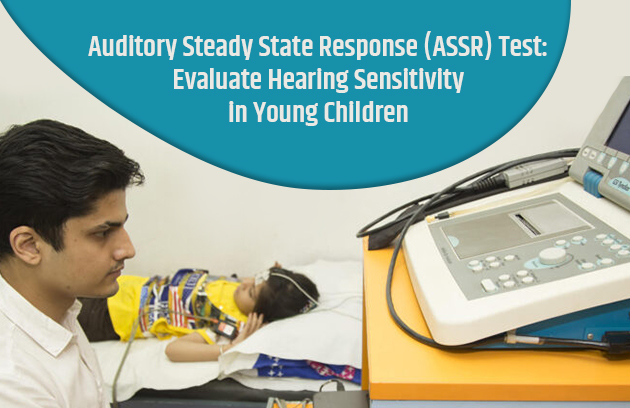Auditory Steady State Response (ASSR) Test: Evaluate Hearing Sensitivity in Young Children
ASSR (Auditory Steady State Response) is a neurophysiological test that detects how the auditory system responds to a periodic (steady-state) auditory stimulus. It is known to be the best hearing test for young children, including infants and toddlers, to evaluate their hearing sensitivity. For young children who are uncooperative and cannot respond to behavioural hearing responses, an ASSR is a non-invasive test that is used to identify hearing loss and monitor the changes in hearing over time.
What is the ASSR Hearing Test?
Auditory Steady State Response is a hearing test that provides information on the lowest frequency at which the brain responds to a sound (or series of sounds). The ASSR hearing test is oriented towards young children, infants, and toddlers because, during the process of this hearing test, active participation of the patient is not required.What is the process of the ASSR hearing test?
In the ASSR test, the brain activity of young children is measured in response to a series of sounds introduced to them. During the procedure, the electrodes are positioned on the forehead and behind the ear of young children. The stimuli of varying frequencies are introduced into the baby’s ears via headphones. The electrodes record the brain’s response to the external stimuli. The recorded stimuli are then analysed by computer software.
What are the Advantages of an ASSR Hearing Test in Children?
Auditory Steady State Response (ASSR) is one of the most objective and non-invasive hearing tests for young children to identify their hearing loss and to evaluate their hearing sensitivity. It is the most useful test for testing hearing in young children and provides many advantages over a behavioural hearing test. The following are some of the major advantages of the ASSR test that demonstrate its suitability for young children.
- Objectivity: Traditional behavioural hearing tests all rely on the child’s cooperation, whereas the ASSR hearing test does not require the child’s cooperation or behaviour, making it the most reliable indicator of hearing abilities.
- Non-invasive: The ASSR test is a more invasive test than other behavioural tests because it only requires earphones and electrodes to determine the brain activity of young children in response to a series of sounds.
- Sensitivity: The Auditory Steady State Response (ASSR) test is the most sensitive test for young children that allows early detection of hearing problems in young children, infants, and toddlers.
- Speed: The ASSR hearing test can be performed in a matter of minutes. It is a faster hearing test for young children than other behavioural tests. It can be performed easily and quickly when the child is sleeping, which makes it a practical option for testing hearing in young children.
Conclusion
Every kid deserves the best start of their life. Hearing affects the language and communication development of young children. The Auditory Steady State Response (ASSR) test is an electro physiologic response to rapid auditory stimuli. In order to provide information about hearing, hearing loss, and auditory rehabilitation in young children. The ASSR hearing test allows audiologists to create statistically valid audiograms for young children who are unable to participate in traditional behavioural hearing.Auditory Steady State Response (ASSR) Test is a highly recommended hearing test by audiologists to evaluate hearing sensitivity in young children.

